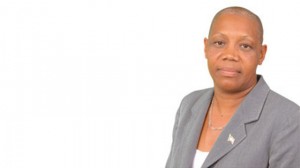
Hon Marcella Liburd
OECS Health Ministers met in St.Vincent and the Grenadines on Thursday 16 October 2014 to develop a comprehensive strategy to help mitigate emerging viral diseases, particularly, chickungunya and Ebola. The meeting, which was addressed by the Director General of the OECS Commission, engaged various regional and international agencies to develop urgent and innovative strategies to combat these debilitating diseases.
On return from that meeting Minister of Health Hon Marcella Liburd told Freedom Fm’s Juni Liburd that the meeting was important to harmonize the regions approach to the Ebola threat.
She indicated that the approach will take three forms.
1. Border protection. This will include the instillation room at air and sea ports as well as travel restrictions.
2. The Training of health workers. Health workers have undergone training since august and this training continues.
3. Communication
Dr James Hospidales has indicated that the Caribbean remains low risk. Meantime, Nigeria has been declared officially free of Ebola after six weeks with no new cases, the World Health Organization (WHO) says.
WHO representative Rui Gama Vaz, speaking in the capital Abuja, said it was a “spectacular success story”.
Nigeria won praise for its swift response after a Liberian diplomat brought the disease there in July.
The outbreak has killed more than 4,500 people in West Africa, mostly in Liberia, Guinea, and Sierra Leone.
An estimated 70% of those infected have died in those countries.
The WHO officially declared Senegal Ebola-free on Friday.
Former Cuban President Fidel Castro offered the United States today his country’s cooperation in the fight against Ebola, despite the rivalry that has kept the two countries at odds for more than half a century, reported dpa news.
“We gladly cooperate with American personnel in this task (the fight against Ebola), and not in pursuit of peace between the two states that have been adversaries for many years but, in any case, for world peace,” Castro said in an article published in the official newspaper “Granma”.
In the text entitled “The time of duty,” the former president praises Cuba’s sending aid to Africa to fight the current epidemic of Ebola.
Cuba gave a “fast response” to the request of the UN, “as it has always done before such a request for cooperation,” said Castro, who ruled the island for nearly half a century until 2006. Today he is the chief advisor to the government of his brother Raul Castro.
Earlier this month Cuba sent a group of 165 medical aid workers in Sierra Leone and has offered to send nearly 300 more to Liberia and Guinea. The three countries are the most affected by the epidemic.
Castro also praised the upcoming summit on Ebola by the countries that make up the left-wing ALBA bloc (Bolivarian Alliance for the Peoples of Our America), to take place on Monday in Havana.
Although removed from power since 2006 after falling seriously ill, the 88-year-old Cuban leader publishes opinion pieces from time-to-time on the front page of the island’s controlled press. His positions on the issues at hand, mainly regarding foreign policy, routinely translate into the stance of the Communist Party and the government.
